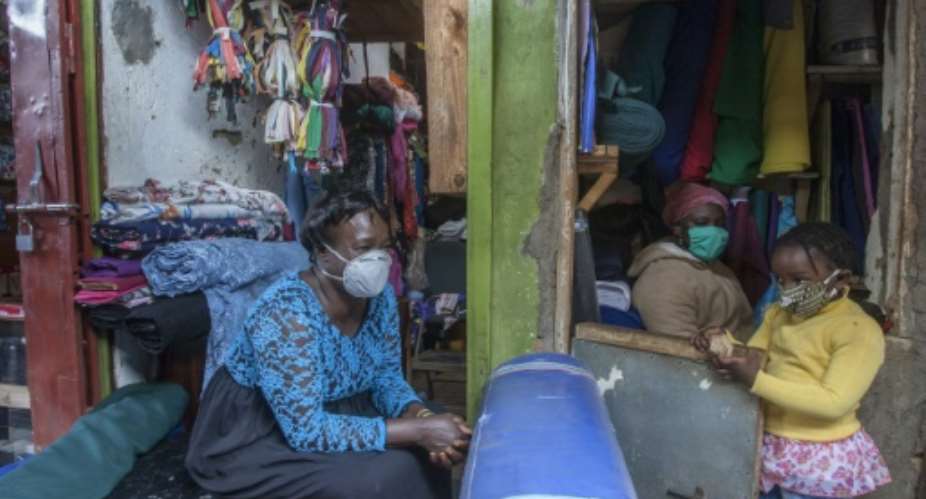Wilise Phiri, a 27-year-old divorced mother of three, survives by selling potato fritters at a roadside market in the Malawian capital Lilongwe, earning the equivalent of about $3 a day.
Last week, her cellphone chimed -- an incoming SMS that turned out to be manna from heaven: Phiri's bank account had just been credited with 72,500 kwacha ($93 or 77 euros).
"It was only upon closer examination that I realised that it was cash the government had promised us many months ago," Phiri said as she and her three youngsters peeled potatoes for her business in Nthandire township.
"I had given up on this," she said.
The government announced a Covid emergency relief plan way back in April, but it is only now being disbursed -- Phiri received a two-month payout.
The package was initially earmarked for one million vulnerable people and small businesses hit by the coronavirus pandemic, over a three-month period.
But in between, governments changed and a new administration narrowed down the number of beneficiaries for the 9.5-billion- kwacha ($25-million) package to around 200,000.
 Malawi. By Jean Michel CORNU (AFP)
Malawi. By Jean Michel CORNU (AFP)
Malawi has so far counted 32,469 Covid-19 cases, of which just over 1,000 have been fatalities.
The package and its late disbursement are rooted in the country's poverty and a bout of political turmoil.
A court last year barred government from imposing a lockdown on grounds there were insufficient measures to cushion loss of livelihood in one of the world's poorest countries.
As a result, the president at the time, Peter Mutharika, vowed to pay the equivalent of $40 monthly to the most vulnerable workers, matching the country's minimum wage.
But two months after the pledge, he was ousted through a court-sanctioned re-election and trounced by opposition leader Lazarus Chakwera.
The bailout was then refocussed. It now targets households falling in so-called "poverty hotspots" in peri-urban areas who primarily rely on informal work or have been laid off from work.
Mismanagement worries
But there are fears of mismanagement around the relief programme, which is also backed by the World Bank, the UN and the European Union.
A separate state-funded Covid-19 package meant to buy protective gear for health workers and teachers, was recently hit by scandal when it emerged that most of the 6.5 billion kwacha went to pay personal allowances and hosting workshops for government officials.
The impropriety forced Chakwera to sack or suspend more than 40 officials from his Covid taskforce, and a probe is now underway.
"We... have a moral and civic duty to do everything we can to ensure that no penny meant for saving lives is stolen or abused, or wasted by anybody," the 65-year-old president said.
Bernard Mphepo, an economist with a group called the Centre for Social Concern, said the relief plan would be a "springboard" enabling some people to recover but cautioned against unrealistic expectations.
"We are too poor to sustain something like this," he said.
Until January this year Malawi was one of the few countries not to have gone into lockdown to curb the spread of the virus.
Gift Trapence, a rights defender who hauled government to court to stop it from imposing the confinement, welcomed the belated disbursement of the aid.
But he warned against any abuse of resources -- "we have seen what has happened to Covid-19 funds under their watch."





 SSNIT must be managed without gov’t interference – Austin Gamey
SSNIT must be managed without gov’t interference – Austin Gamey
 Ejisu by-election could go either way between NPP and independent candidate — Gl...
Ejisu by-election could go either way between NPP and independent candidate — Gl...
 We never asked ministers, DCEs to bring NPP apparatchiks for returning officer r...
We never asked ministers, DCEs to bring NPP apparatchiks for returning officer r...
 No one denigrated the commission when you appointed NDC sympathizers during your...
No one denigrated the commission when you appointed NDC sympathizers during your...
 Used cloth dealers protests over delayed Kumasi Central Market project
Used cloth dealers protests over delayed Kumasi Central Market project
 A/R: Kwadaso onion market traders refuse to relocate to new site
A/R: Kwadaso onion market traders refuse to relocate to new site
 Dumsor: Corn mill operators at Kaneshie market face financial crisis
Dumsor: Corn mill operators at Kaneshie market face financial crisis
 Jamestown fishermen seek support over destruction of canoes by Tuesday's heavy d...
Jamestown fishermen seek support over destruction of canoes by Tuesday's heavy d...
 Election 2024: EC to commence voter registration exercise on May 7
Election 2024: EC to commence voter registration exercise on May 7
 Public schools rebranding: We’re switching to blue and white, we’re painting all...
Public schools rebranding: We’re switching to blue and white, we’re painting all...
